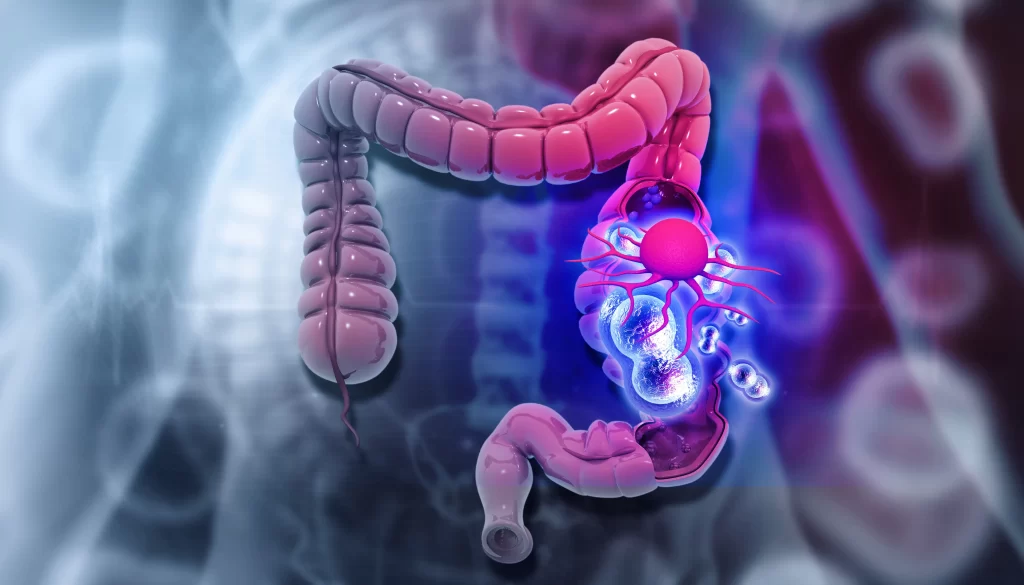Table of Contents
Cancer is surely one of the most challenging concerns in health today, and colorectal cancer alone stands as a significant global health issue. Understanding the critical importance of early detection can mean the difference between a manageable health challenge and a life-threatening condition. This reading will explain the benefits of detecting colorectal cancer in its earliest stages.
1. Dramatically Improved Survival Rates
The statistics surrounding early-stage colorectal cancer survival are nothing short of remarkable. When detected at Stage 0 or Stage 1, the five-year survival rate soars above 90%—a testament to the power of early detection. Here’s a scientific breakdown of survival rates:
Stage 0
Stage 0 (Carcinoma in situ) is where abnormal cells are detected exclusively within the inner lining of the colon or rectum before penetrating deeper tissue layers. At this stage, the cancer is completely confined and has not spread beyond its original location, making surgical removal typically straightforward and highly successful. The near 100% survival rate reflects the cellular changes’ minimal invasiveness and extremely localized nature.
Stage 1
This stage of colorectal cancer is characterized by the cancer’s growth through the initial layers of the colon or rectum wall without spreading beyond the organ. With a remarkable 92% five-year survival rate, patients have an extremely favorable prognosis at this stage. The cancer remains small and contained, allowing for targeted surgical removal and minimal additional treatment.
Stage 2
This stage signifies a significant progression, as the cancer has penetrated the colon or rectum wall. However, it has not metastasized to nearby lymph nodes. The approximately 63% five-year survival rate underscores the increasing complexity of treatment and the importance of early detection.
While still manageable, this stage requires more comprehensive medical approaches, including potential chemotherapy and more extensive surgical procedures.
Stage 3
Stage 3 is a critical stage of cancer spread wherein cancer has reached the nearby lymph nodes but not distant body parts. The five-year survival rate is about 33%. At this stage, patients require aggressive and multifaceted treatment approaches. Usually, patients are treated with surgery, chemotherapy, and possibly radiation as medical teams work intensively to prevent further spread.
Stage 4
Stage 4 is the most advanced stage of colorectal cancer, characterized by metastasis to distant organs such as the liver, lungs, or other parts of the body. With a stark survival rate of roughly 11%, this stage presents the most challenging treatment landscape. Medical interventions at this point focus primarily on prolonging life, managing symptoms, and maintaining quality of life, highlighting the absolutely critical nature of early detection and intervention in colorectal cancer management.
The dramatic decline in survival rates as the cancer progresses underscores the critical nature of early detection.
2. Prevention
Early screening goes beyond mere detection—it’s a powerful preventive strategy. Colonoscopies allow healthcare professionals to identify and remove precancerous polyps before they can develop into full-blown cancer.
In regions like Singapore, where advanced medical technologies are readily available, colonoscopy Singapore has become an essential tool for identifying potential cancerous growths at their earliest stages.
Here are the types of polyps that colonoscopies may find and their risk levels:
- Hyperplastic polyps: Generally low risk
- Adenomatous polyps: Higher risk of becoming cancerous
- Sessile Serrated polyps: Increased cancer risk
- Traditional Serrated Adenomas: Highest risk of progression
Modern medical techniques enable completely removing these polyps during screening, which may help interrupt the cancer development process. This proactive approach means preventing cancer before it can take root.

3. Economic Implications
The economic benefits of early colorectal cancer detection are substantial and far-reaching. Late-stage cancer treatments are exponentially more expensive and resource-intensive. Here’s a simple cost comparison:
- Early-stage treatment average cost: USD$ 30,000 – 50,000
- Advanced-stage treatment average cost: USD$ 100,000 – 250,000
- Potential healthcare system savings: Estimated USD$ 1.5 billion annually through increased screening
These financial considerations extend beyond individual patient expenses, impacting broader healthcare system economics. By reducing the number of advanced cancer cases, healthcare resources can be more efficiently allocated.
4. Enhanced Quality of Life
Early detection of colorectal cancer may help transform the patient’s medical journey. If cancer is diagnosed in its early stages, patients will be offered minimally invasive surgeries, shorter hospital stays, and significantly faster recovery times with a reduced likelihood of lifestyle disruption.
In contrast, advanced-stage treatments are more complex surgeries, longer and more invasive chemotherapy, potential long-term side effects, and a high chance of permanent physical impairment.
But in terms of overall contrast, it’s profound: early detection offers hope, minimal medical intervention, and, indeed, a greater chance of returning to life as usual. Late detection, on the other hand, often heralds more aggressive, physically and emotionally taxing treatments likely to alter a patient’s quality of life permanently.
5. Increasing Public Awareness and Accessibility
The push for early detection has led to a greater public understanding of colorectal cancer screening. This increased awareness is crucial, especially given the rising incidence of colorectal cancer among younger populations. Public health campaigns and educational initiatives are breaking down barriers and encouraging proactive health measures.
More people now understand that screening isn’t something to fear but a vital step in maintaining overall health. This shift in perspective can lead to higher participation rates in screening programs.
6. Continuous Monitoring and Adaptive Treatment
For individuals already diagnosed with colorectal cancer, regular screening becomes an essential tool for monitoring disease progression. Healthcare providers can use these screenings to assess treatment effectiveness and make timely adjustments to therapeutic strategies.
Think of it like having a continuous health dashboard that provides real-time updates, allowing medical professionals to be responsive and adaptive in their approach.
Practical Recommendations
Here are six ways that can make a substantial difference in your colorectal health:
- Begin regular screenings at the recommended age (typically 45)
- Know your family medical history
- Maintain a healthy diet rich in fiber
- Exercise regularly
- Limit alcohol consumption
- Avoid tobacco products
Taking a proactive, holistic approach to your health can significantly reduce your risk and empower yourself with knowledge and action.
Final Thoughts
Early detection of colorectal cancer is a smart strategy for protecting your health, reducing treatment complexity, and improving life outcomes. Through awareness, proactive steps, and commitment to regular checks, this one can greatly reduce cancer risks and improve the chances of success in treatment.




